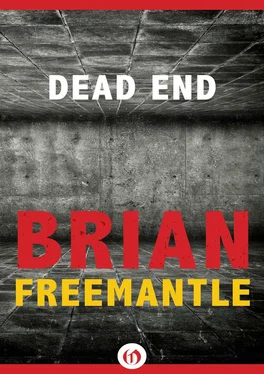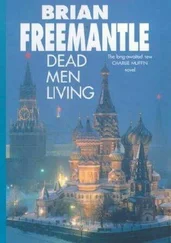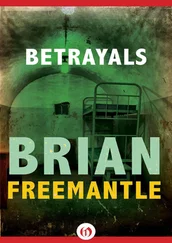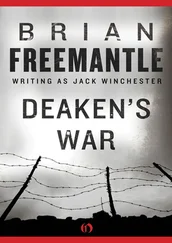Brian Freemantle - Dead End
Здесь есть возможность читать онлайн «Brian Freemantle - Dead End» весь текст электронной книги совершенно бесплатно (целиком полную версию без сокращений). В некоторых случаях можно слушать аудио, скачать через торрент в формате fb2 и присутствует краткое содержание. Жанр: Триллер, на английском языке. Описание произведения, (предисловие) а так же отзывы посетителей доступны на портале библиотеки ЛибКат.
- Название:Dead End
- Автор:
- Жанр:
- Год:неизвестен
- ISBN:нет данных
- Рейтинг книги:3 / 5. Голосов: 1
-
Избранное:Добавить в избранное
- Отзывы:
-
Ваша оценка:
- 60
- 1
- 2
- 3
- 4
- 5
Dead End: краткое содержание, описание и аннотация
Предлагаем к чтению аннотацию, описание, краткое содержание или предисловие (зависит от того, что написал сам автор книги «Dead End»). Если вы не нашли необходимую информацию о книге — напишите в комментариях, мы постараемся отыскать её.
Dead End — читать онлайн бесплатно полную книгу (весь текст) целиком
Ниже представлен текст книги, разбитый по страницам. Система сохранения места последней прочитанной страницы, позволяет с удобством читать онлайн бесплатно книгу «Dead End», без необходимости каждый раз заново искать на чём Вы остановились. Поставьте закладку, и сможете в любой момент перейти на страницу, на которой закончили чтение.
Интервал:
Закладка:
‘I don’t want any wrong starts or confrontations, either,’ said Parnell, easily. ‘I accepted Dubette’s approach precisely because I recognized the opportunity to extend genetic science through an international organization with huge research resources. That’s all I’m asking for, that chance to do the work I came here to do. But can’t.’
‘Leave me to work it out.’
‘So, I’ll get the laboratory I want, where I want it?’ persisted Parnell.
‘That’s confrontational!’ accused the spindly man.
‘That’s honest,’ contradicted Parnell.
‘I said leave it with me,’ insisted the American.
If he pushed any further – any harder – they’d both fall off the edge, Parnell accepted. ‘I’m glad we’ve had this conversation.’
‘So am I.’
Liar, Parnell thought. It was a trait he’d have to remember.
‘I’m grateful for your staying late,’ thanked Newton, who’d spent the afternoon with Dubette’s in-house lawyers and didn’t like what he’d been told.
‘There’s obviously a reason for your asking,’ said Russell Benn. He was the large, black, rumbling-voiced scientific director of the predominant antibacterial research sections of the laboratory.
‘We’re going to have to move things around a little. Make some space,’ announced the vice president.
Benn frowned. ‘Space for what?’
‘The English guy, Parnell, who’s opening up the genetics section.’
‘For what?’ repeated the other man.
‘He has to be part of the inner core, able to liaise with you.’
‘I need all the space I’ve got,’ protested Benn.
‘This is how it’s got to be, Russ: how I want it to be.’ Newton enjoyed the power, knowing that people were actually frightened of him, as he, in turn, was frightened of Edward C. Grant. Newton promised himself he’d manipulate Parnell as he would a piece of modelling clay, until Parnell was as pliably obedient as he’d made everyone else in the research and development division.
Benn, who was trying to put three of his five sons through private school and had a mortgage lapping up to his chin, shrugged and said: ‘It’s going to upset things. My guys like their routines: knowing where they are.’
‘It’s what I want,’ insisted Newton.
‘If it causes problems, I’ll need to talk to you about it,’ said Benn, anxious to pretend he was not as intimidated as everyone else enmeshed in the Spider’s Web.
‘Do that!’ urged the director, sincerely. ‘The moment there’s a problem, a conflict, I want to know about it.’ That afternoon the legal opinion had been that professional disruption affecting major research nullified Parnell’s breach-of-contract claim and provided Dubette with a matching pressure to keep him in line: an outer, not an inner line.
Two
Richard Parnell’s reassigned research area was directly in line with the vice president’s office, which Parnell supposed was intended to be intimidating but wasn’t. He was far more interested in the newly arrived equipment, everything he’d requested without a single budgetary challenge. Which was what he told Russell Benn at their first meeting after his transfer.
‘Glad you’re satisfied,’ said the other man, the voice seeming to come from deep within him.
Parnell at once discerned the resentment. ‘I’d like to think we’re going to get on together.’
‘So would I.’
‘Why don’t we establish our parameters right now?’
‘Why don’t we?’ echoed Benn.
He was pushing against a closed door, thought Parnell. ‘I’m here to head up a new pharmacogenomics division, right?’
The black scientist nodded.
‘That involves me – or the people who are going to join me – employing what was discovered during the genome project to drug development. Which is your division, so we’re going to have to work pretty closely together, wouldn’t you agree?’
‘You really think you can make a contribution genetically to what we do here?’ demanded Benn.
‘You accept that more than ninety per cent of the drugs produced – drugs we produce – are only effective upon between thirty to fifty per cent of the people for whom they’re prescribed!’
‘I’ve heard the figures. I think they’re debatable.’
‘And you’ve heard of single-nucleotide polymorphisms?’
‘Genetically matching a person to the most efficacious drug? Sure I’ve heard of it.’
‘But aren’t impressed by it?’ challenged Parnell.
‘I’m waiting to be convinced.’
‘ Abacavir,’ threw back Parnell, at once.
‘OK,’ conceded the other man. ‘So, genetically it has been established that abacavir is a drug that could, potentially, be fatal to about five per cent of HIV sufferers in AIDS treatment.’
‘And brings out violent skin reaction, rashes, in those to whom it isn’t fatal?’ persisted Parnell.
‘I’ve read the findings and the stats.’
‘Scientifically accepted findings and statistics,’ insisted Parnell. ‘Like there’s general scientific acceptance that single nucleotide polymorphisms could not only test people’s vulnerability to a particular drug’s side effects but also whether or not it will work at all.’
‘You want coffee?’ the other man invited suddenly, making a vague movement to a percolator on a side table upon which several mugs, all loyally marked with the Dubette logo, were laid out in readiness.
Parnell recognized it as a gesture. ‘Coffee would be good.’
‘You know your stuff,’ said Benn, as he poured.
‘You were testing me!’ accused Parnell.
‘Wasn’t that what you were doing with me?’
‘No!’ denied Parnell. ‘I was trying to build a bridge for both of us to cross.’
‘Seems to me you’re arguing against superbug resistance?’
The awkward bastard was still testing, Parnell decided. ‘I think – and intend to prove – that pharmacogenomics could become successful enough to reduce antibiotic resistance or rejection.’
The other scientist fixed him with a direct stare, unspeaking for several moments. Then he said: ‘Am I hearing what you’re saying?’
‘It’s a self-defeating ladder, developing stronger antibiotics when resistance makes useless those that already exist. Making cocktails of drugs, a lot of the constituents of which are totally ineffective and can even be harmful, is bad medicine. The logic can only be the build-up of even greater resistance which in turn needs even greater – stronger – antibiotics. It’s happened worldwide with methicillin-resistant staphylococcus aureus. We’re breeding our own superbugs from superbugs, not eradicating anything.’
‘Eradicating?’ picked out Benn, at once.
‘Isn’t eventual eradication the focus of medical science?’ frowned Parnell.
‘ Medical science,’ heavily qualified Benn. ‘Our focus is pharmaceutical research and developing and improving drugs to combat known diseases.’
‘Aren’t they allied?’
‘I suppose that’s a point of view,’ allowed the section director, doubtfully.
‘It’s always been mine.’
‘You haven’t yet been to a company seminar, have you?’ asked Russell Benn.
‘Not yet,’ said Parnell.
‘There’s one soon. You’ll find it interesting.’
‘I am finding this conversation interesting,’ said Parnell, directly. ‘Interesting as well as confusing.’
‘Did you know that years ago tyre manufacturers perfected a tyre that never wears out: if they were fitted to cars and trucks they’d last the lifetime of the vehicle.’
‘No, I didn’t know that,’ encouraged Parnell, who did, but wanted the analogy expanded.
‘Planned obsolescence,’ declared Benn.
Читать дальшеИнтервал:
Закладка:
Похожие книги на «Dead End»
Представляем Вашему вниманию похожие книги на «Dead End» списком для выбора. Мы отобрали схожую по названию и смыслу литературу в надежде предоставить читателям больше вариантов отыскать новые, интересные, ещё непрочитанные произведения.
Обсуждение, отзывы о книге «Dead End» и просто собственные мнения читателей. Оставьте ваши комментарии, напишите, что Вы думаете о произведении, его смысле или главных героях. Укажите что конкретно понравилось, а что нет, и почему Вы так считаете.












